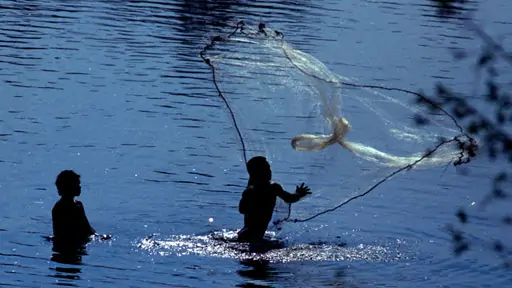Indigenous Calendar May, 2013: Kachok Fishing and a Circular History

Whether we call it the "modern" world or something else, for most of us mass production is one of the cornerstones of today's society. Probably the single most important change in all of human history is the development of methods that first enabled the mass production of food. The exact details of how this came about are still being debated. We do know, however, that over the course of a few thousand years, some nomadic societies learned how to preserve, store and eventually grow their own food.
The impact of this change cannot be overstated: it allowed these nomadic groups to become sedentary for the first time. From that point the progression to today's mass society was almost inevitable. Control of food supplies provided the stability and sustainability necessary for a chain of events. At first the population at sedentary sites rapidly increased. This led to the evolution of organizing principles that are at the heart of all large societies: cultural norms, social stratification and land ownership, law and political governance and trade and barter. Without these principles no large society could function and survive. But a large, functional, organized and stable society supports trial-and-error experimentation. Such experimentation took place over thousands of years and resulted in understanding of mathematics, engineering, astronomy etc. as well as the development of irrigation, construction, literacy etc. So important are these that none of the great historical empires could have arisen without them.
Today there are very few nomadic (or even semi-nomadic) societies left. Ironically, much of the recent abandonment of that lifestyle by indigenous peoples has been forced at the hands of post-colonial rulers who would not have colonized their lands without the sequence of events described above.
In northeastern Cambodia live the Kachok. Although hunting is still prominent in their survival, they are now a sedentary people. As I was about to leave one of their villages I saw these two men fishing by casting their net. People have fished this Mekong River tributary this way for thousands of years. After I took this photo I began to realize that this very fishing technique is one of the ancient developments that ultimately allowed me to travel to this part of the world and take the photograph.
The Kachok are featured in our documentary, Indigenous Peoples of Southeast Asia.
If you enjoyed reading this article, please consider supporting independent, advertising-free journalism by buying us a coffee to help us cover the cost of hosting our web site. Please click on the link or scan the QR code. Thanks!


